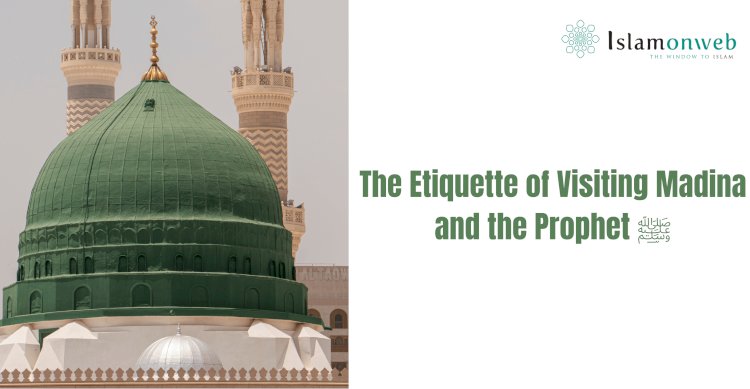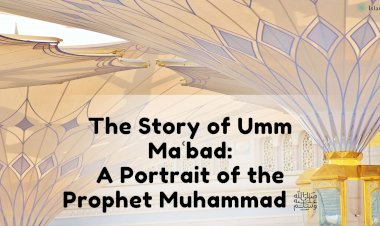The Etiquette of Visiting Madina and the Noble Grave of the Prophet ﷺ
Visiting al-Madīnah al-Munawwarah, the illuminated city of the Prophet ﷺ, is a spiritual encounter that stirs the depths of a believer’s soul. It is an act of devotion and love, a noble longing to be in the presence of the one whom Allah chose as a mercy to the worlds. The Prophet ﷺ said:
«لا تُشَدُّ الرِّحالُ إلَّا إلى ثلاثةِ مساجدَ: المسجدِ الحرامِ، ومسجدي هذا، والمسجدِ الأقصى»
“Do not undertake a journey except to three mosques: al-Masjid al-Ḥarām, this mosque of mine, and al-Masjid al-Aqṣā.” (Ṣaḥīḥ al-Bukhārī)
From this hadith, scholars agreed that travelling to visit the Prophet’s Mosque is a recommended and meritorious act (‘ibādah mustaḥabbah) at any time. It is a sacred journey filled with reverence, love, and humility.
If Allah grants someone the opportunity to visit Madina, it is a divine favour that calls for sincere gratitude. A believer must acknowledge this blessing inwardly and outwardly, realising that this city is not like any other. It is the sanctuary (ḥaram) of the Messenger ﷺ, the city of his Hijrah, the cradle of the first Islamic state, the dwelling of revelation, and the place where the Prophet ﷺ is buried.
It is the source from which light radiated to the world. The virtues of Madina are immense. The Prophet ﷺ said:
«من أرادَ أهلَ المدينةِ بسوءٍ أذابَهُ اللَّهُ كما يذوبُ الملحُ في الماءِ»
“Whoever intends to harm the people of Madina, Allah will cause him to melt like salt dissolves in water.” (Ṣaḥīḥ Muslim)
This reflects the sanctity of the city. The Prophet ﷺ declared it inviolable, saying:
«إنَّ إبراهيمَ حرَّمَ مكةَ، وإنِّي حرَّمتُ المدينةَ ما بين لابتَيها، لا يُقطَعُ عضاهُها، ولا يُصادُ صيدُها»
“Ibrāhīm made Makkah sacred, and I made Madina sacred between its two lava hills. Its thorny bushes must not be cut, and its game must not be hunted.” (Ṣaḥīḥ Muslim)
Thus, Madina holds a sanctity comparable only to Makkah, and no other land shares this honour.
Devotion in the Prophet’s Mosque
One of the highest acts a pilgrim can engage in while in Madina is frequenting al-Masjid al-Nabawī. Every moment spent in worship there is multiplied in reward. The Messenger of Allah ﷺ said:
«صلاةٌ في مسجدي هذا خيرٌ من ألفِ صلاةٍ فيما سواهُ إلا المسجدَ الحرامَ»
“A prayer in this mosque of mine is better than a thousand prayers in any other mosque, except al-Masjid al-Ḥarām.” (Ṣaḥīḥ al-Bukhārī)
The sanctity of al-Masjid al-Nabawī demands deep inner etiquette and awareness. When the Abbasid Caliph Abū Jaʿfar al-Manṣūr once raised his voice while speaking to Imam Mālik in the Prophet’s Mosque, the Imam rebuked him gently but firmly, saying:
“O Commander of the Faithful, do not raise your voice in this mosque. Allah has taught people proper conduct by saying:
{يَا أَيُّهَا الَّذِينَ آمَنُوا لَا تَرْفَعُوا أَصْوَاتَكُمْ فَوْقَ صَوْتِ النَّبِيِّ...}
‘O you who believe! Do not raise your voices above the voice of the Prophet...’ [Sūrat al-Ḥujurāt: 2]
And He praised those who honour the Prophet by saying:
{إِنَّ الَّذِينَ يَغُضُّونَ أَصْوَاتَهُمْ...}
‘Indeed, those who lower their voices in the presence of the Messenger of Allah—they are the ones whose hearts Allah has tested for righteousness...’ [Sūrat al-Ḥujurāt: 3]
And He criticised those who were heedless, saying:
{إِنَّ الَّذِينَ يُنَادُونَكَ...}
‘Indeed, those who call you from behind the chambers—most of them do not reason.’ [Sūrat al-Ḥujurāt: 4]”
Then Abū Jaʿfar asked him, “Shall I face the qiblah and make duʿā or face the Messenger of Allah ﷺ?” Mālik replied:
“Why would you turn your face away from him when he is your means (wasīlah) and the means of your father Ādam to Allah on the Day of Judgement? No, face him and seek his intercession—Allah will grant it. For Allah has said:
{وَلَوْ أَنَّهُمْ إِذْ ظَّلَمُوا أَنْفُسَهُمْ جَاؤُوكَ...}
‘And if, when they wronged themselves, they had come to you and asked Allah's forgiveness, and the Messenger had asked forgiveness for them, they would have found Allah Accepting of repentance and Merciful.’ [Sūrat al-Nisāʾ: 64]”
Emotional Reverence of the Early Generations
Despite the Prophet’s ﷺ humility and approachability, the noble Companions (ṣaḥābah) were the most reverent and well-mannered in his presence.
Sayyidunā ʿAmr ibn al-ʿĀṣ (رضي الله عنه) said:
“I was never able to fully gaze upon the Messenger of Allah ﷺ out of awe for him. And if you asked me to describe him, I would not be able to, for I never filled my eyes with his image.”
(Related by Imam Muslim)
Their adab continued even after his passing. When visiting his grave, they stood with humility, greeting him with salām, offering prayers, and lowering their gaze and voice, as if he were still physically among them. Such decorum is rarely seen today, but every sincere believer should strive to revive it.
The early generations—Imām Mālik, Imām Jaʿfar aṣ-Ṣādiq, Ayyoob as-Sakhtiyānī, Ibn al-Munkadir, and many others—exemplified what it means to honour the Prophet ﷺ even in his absence. They would weep when his name was mentioned, their colours would change, their voices would lower, and their hearts would tremble.
Imām Mālik would say:
“I never narrated a ḥadīth except in a state of wuḍū’,
It was said about him:
“Whenever the Prophet ﷺ was mentioned in front of him, his face would change and he would lower his head. When asked why, he responded, ‘Had you seen what I have seen, you would not object to what you see from me.’”
To visit Madina is to walk into the presence of mercy, history, and sanctity. It is a time for the believer to refine their inner state, deepen their love for the Prophet ﷺ, and imitate the adab of those who truly knew his worth. It is not a trip for sightseeing, but a moment for the heart to stand still, weep, and speak silently to the messenger of Allah ﷺ who longed for us.
It is narrated in al-Shifāʾ by Qāḍī ʿIyāḍ that:
“A woman once said to ʿĀʾishah (may Allah be pleased with her), ‘Unveil for me the grave of the Messenger of Allah ﷺ.’ She unveiled it for her, and the woman wept until she passed away.”
(al-Shifāʾ, 2/53)
Such was the intensity of love and longing for the Prophet ﷺ in the hearts of the early believers—where merely seeing his grave caused a person to dissolve in tears and depart from this world in a state of yearning.
“Peace be upon you, O Messenger of Allah, and may my soul, my wealth, and my life be a ransom for you.”
Entering Madina: With Heartfelt Presence
A visitor to al-Madīnah al-Munawwarah should enter with inner stillness, awe, and the remembrance that they are in the sanctuary of Allah and the abode of His Chosen Messenger ﷺ. Upon sighting the city, the believer should send abundant ṣalawāt upon the Prophet ﷺ.
When arriving at the boundaries of the ḥaram, it is recommended to say:
“O Allah, this is the sacred precinct which You made inviolable through the tongue of Your Prophet and Beloved ﷺ. He asked You to bless it as You have blessed the Ḥaram of Your House. So make me forbidden to the Hellfire, grant me safety from Your punishment on the Day You resurrect Your slaves, and grant me what You have given Your close friends and the righteous. Help me to uphold good manners, perform righteous deeds, and avoid evil while I dwell in this blessed city.”
Entering the Masjid: With Intentional Dignity
Upon reaching one of the gates of the Prophet’s Mosque (al-Masjid al-Nabawī), the visitor should enter with the following etiquette:
- Say: Bismillāh and send ṣalawāt upon the Prophet ﷺ.
- Make duʿā: Asking Allah to honour you with forgiveness, blessings, and acceptance in this sacred masjid.
- Perform two rakʿāt: As taḥiyyat al-masjid (the greeting prayer to the masjid).
However, scholars such as Imām Mālik and others permitted visiting the Prophet’s grave before praying the greeting of the masjid—especially if entering from a gate that leads directly to the Rawḍah or the blessed chamber. In such cases, one is permitted to begin with the visitation (ziyārah) and then perform the prayer. The rationale is rooted in adab and prioritising the honour of the Prophet ﷺ.
But if one enters from another side of the masjid that does not immediately face the blessed grave, then it is more appropriate to first pray the greeting and then walk towards the grave.
At the Noble Grave: With Love, Silence, and Presence
When approaching the blessed grave, one should lower their gaze, soften their voice, and stand still in deep reverence. Facing the Prophet ﷺ, say the salām:
"As-salāmu ʿalayka yā Rasūl Allāh, as-salāmu ʿalayka yā Nabiyy Allāh, as-salāmu ʿalayka yā Ḥabīb Allāh. May peace be upon you, O Messenger of Allah, O Prophet of Allah, O Beloved of Allah."
Then offer salām to Sayyidunā Abū Bakr al-Ṣiddīq and Sayyidunā ʿUmar ibn al-Khaṭṭāb (may Allah be pleased with them both).
Imām Mālik and other righteous scholars insisted on approaching the Prophet’s ﷺ resting place with a heart filled with humility and lips busy with duʿā and dhikr—not with idle conversation, photography, or raised voices.
As the believer reaches the sacred presence of the Prophet ﷺ, a moment of awe, humility, and immense spiritual intimacy unfolds. One stands not before an ordinary grave but before the resting place of the one whom Allah has honoured above all creation—the Seal of the Prophets, the Beloved of Allah, Sayyidunā Muḥammad ﷺ.
Facing the Prophet ﷺ – A Practice Rooted in Love and Sunnah
Imām Mālik (رحمه الله) is reported to have said, as narrated by al-Ḥāfiẓ Abū Mūsā al-Aṣfahānī:
“When a man intends to visit the grave of the Prophet ﷺ, he should turn his back to the qiblah and face the Prophet ﷺ, sending blessings upon him and making duʿā for him.”
This practice, known as istiqbāl al-qabr (facing the grave), has been narrated by various scholars and righteous predecessors. Ibn Ḥabīb, as quoted by Ibn Yūnus, similarly instructed:
“After completing two rakʿāt, proceed to the grave from the direction of the qiblah, approach it, greet the Messenger of Allah ﷺ, praise him, and be in a state of serenity and reverence. For indeed, the Prophet ﷺ hears and knows of your presence.”
One must then send salām also to Sayyidunā Abū Bakr and Sayyidunā ʿUmar (رضي الله عنهما), standing with composure and deep respect.
Imām Ibrāhīm ibn Ḥarbī (رحمه الله) wrote in his Manāsik:
“Turn your back to the qiblah and face the centre of the noble grave.”
And Imām Ibn al-Mubārak, as quoted by al-Majd al-Lughawī, narrated:
“I saw Ayyoob as-Sakhtiyānī when he visited the grave. He placed his back toward the qiblah and faced the Prophet ﷺ, and he wept—not out of display, but sincerely. He stood as one possessing true understanding.”
These narrations show that the practice of turning away from the qiblah to face the Prophet ﷺ at his grave is deeply rooted in the traditions of the righteous predecessors. In fact, Imām Abū Ḥanīfah (رحمه الله) said:
“I never remembered Ayyoob as-Sakhtiyānī without weeping. I once saw him clinging to the Prophet’s ﷺ grave in a way I never saw from anyone else.”
Imām al-Samhūdī (رحمه الله) states in Khulāṣat al-Wafā:
“The position of the companions of Imām al-Shāfiʿī and others is that one stands with his back to the qiblah and his face toward the noble chamber (al-ḥaḍrah al-nabawiyyah). This is also the view of Imām Aḥmad ibn Ḥanbal.”
The Ḥanafī jurist Imām Ibn al-Humām (رحمه الله) rejected contrary views, asserting:
“The opinion of Abū Layth that one should face the qiblah is rejected by what Abū Ḥanīfah narrated in his Musnad from Ibn ʿUmar, who said: ‘It is from the Sunnah to approach the grave of the Prophet ﷺ from the direction of the qiblah, placing your back to the qiblah and your face toward the grave, and then say: As-salāmu ʿalayka ayyuhā an-Nabiyy wa raḥmatullāhi wa barakātuh.’”
(Fatḥ al-Qadīr, 3/180)
In al-Mansak al-Kabīr, Ibn Jamāʿah outlines the Ḥanafī approach:
“The Hanafī method is to begin by standing at the noble head of the Prophet ﷺ such that it is on your left, then move until you are directly opposite his face, turning your back to the qiblah and facing the grave.”
Practical Guidelines for the Visitor to Madina and the Noble Grave
Drawing from the practices of the Companions, the Tābiʿūn, and the leading scholars, the following points summarise the practical etiquettes of visiting the Messenger of Allah ﷺ, many of which can still be observed—even if certain physical acts are no longer possible.
- Sincere Intention (Ikhlāṣ al-Niyyah):
Begin your journey with the intention of seeking closeness to Allah by honouring His Messenger ﷺ. Let your heart be filled with love, longing, and humility. - Growing Longing as You Approach:
As your journey progresses and the city of Madina draws nearer, let your heart grow in eagerness and yearning. It is the abode of mercy and the chosen sanctuary of the Final Prophet ﷺ. - Departure with Duʿā and Salawāt:
Leave your home with Bismillāh and ṣalawāt upon the Prophet ﷺ, supplicating that Allah make your journey blessed, sincere, and accepted. - Frequent Salutations (Ṣalawāt) on the Way:
During your travel, increase your recitation of ṣalāt ʿalan-Nabī ﷺ. This opens hearts and prepares the soul for the spiritual weight of the visit. - Ghusl, Fragrance, and Clean Clothing:
Upon nearing Madina, perform ghusl, apply fragrance, and wear your best clothing. This was recommended by scholars including the Shāfiʿīs and Ḥanbalīs. - Seeing the Green Dome (al-Qubbah al-Khaḍrāʾ):
When your eyes fall upon the green dome, recall Allah’s majesty and the status of His Messenger ﷺ. This is the sacred earth that holds the most honoured of all creation. - Dignified Conduct in the Streets of Madina:
Walk through the streets of Madina with calmness, respect, and humility. Smile at its people—they are neighbours to the Prophet ﷺ and descendants of the Anṣār and Muhājirūn. - Give Charity to the Poor of Madina:
Before entering the masjid or visiting the grave, give ṣadaqah as a gesture of gratitude and blessing. - After Entering the Masjid:
- Perform taḥiyyat al-masjid if possible.
- Engage in dhikr, duʿā, and Qur’an recitation.
- Intend iʿtikāf while seated in the mosque.
- At the Noble Grave:
- Stand calmly and reverently before the chamber.
- Keep your gaze lowered, your limbs still, and your hands folded as in prayer.
- Maintain a respectful distance (3–4 arm-lengths) from the grave.
- Send salām upon the Prophet ﷺ and his two noble companions.
If direct access is restricted, stand anywhere within the mosque (especially along the southern side), face the qiblah or turn your heart toward the grave in your duʿā, and maintain the same adab internally.
- Supplicate by His Noble Status (Tawassul):
- Praise him, seek Allah’s mercy by his intercession, and ask for forgiveness.
- Use established ṣalawāt and duʿāʾs from the righteous.
- If not able to say much, speak briefly but with utmost sincerity and good etiquette.
- Greeting Abū Bakr and ʿUmar (رضي الله عنهما):
- After greeting the Prophet ﷺ, step slightly right to greet Sayyidunā Abū Bakr, then again to greet Sayyidunā ʿUmar.
- Return to stand before the Prophet ﷺ to complete your duʿā and visitation.
- Visiting Other Sacred Sites Within the Masjid:
- Visit the minbar, Rawḍah, and other parts of the masjid.
- If access to Rawḍah is restricted, pray near it, and know that the entire mosque is blessed.
- Passing by the Chamber (From Inside or Outside):
- If you walk by the blessed grave at any time, pause in stillness and send salām with your heart.
- Imām Mālik emphasised doing so, whether near or at a distance.
- Continuous Salawāt Throughout Stay in Madina:
- Increase your ṣalawāt on the Prophet ﷺ in the mosque, your lodging, in the streets, and in your heart.
- Bidding Farewell Before Departure:
- Before leaving Madina, repeat the visitation to the grave.
- Offer final salām, make duʿā, and ask Allah not to make this your last visit.
- Leave the mosque with humility and sorrow, continuously sending ṣalām as you depart the city.
Final Words of Advice
For those honoured to visit the Prophet ﷺ, remain mindful of your behaviour. Do not rush, speak vainly, or behave lightly. Before entering the Rawḍah or approaching the grave, empty your heart from worldly distractions and fill it with love, longing, and awe.
Also, seek out other sacred places in Madina where battles were fought, miracles occurred, and companions were buried—these are part of the spiritual geography of Islam.
“May Allah accept your visit, renew it for you often, and make you among those who are blessed with his intercession and company in the hereafter.”
“O Allah, let our hearts melt in love for Your Messenger, as theirs did. Grant us the adab of those who knew his worth, and never deprive us of the blessing of standing before him in this world—and his intercession in the next.”
اللهم صل وسلم وبارك على سيدنا محمد وعلى آله وصحبه أجمعين، عدد خلقك ورضا نفسك وزنة عرشك ومداد كلماتك.
Disclaimer
The views expressed in this article are the author’s own and do not necessarily mirror Islamonweb’s editorial stance.

























Leave A Comment